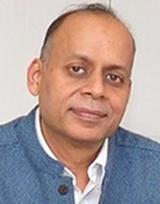Experts
Ajay Kumar

Former Nonresident Senior Fellow, Technology and Society Program
About
Ajay Kumar is a former nonresident senior fellow at Carnegie India. He served as the defense secretary of India between August 2019 and October 2022 and is the longest serving secretary in Ministry of Defence, where he also served as secretary in the Department of Defence Production.
As the defense secretary of India, he was the key architect for several major transformations including restructuring of higher defense management in the country and formation of the chief of defense staff in the Indian Armed Forces; the launch of Agniveer scheme—a historic reform in recruitment, training, and retention of personnel in the Armed Forces. He was among the key decision-makers who successfully managed the tense stand-off on Indo-China Line of Actual control resulting after the Galwan incident of 2020.
Kumar is credited to have transformed the defense industry ecosystem under the AtmaNirbhar Bharat. He also conceptualized and implemented the historic corporatization of a two hundred year old, 80,000 employee strong Ordnance Factories Board. He also originated the Innovation for Defence Excellence (iDEX) Programme—a start-up ecosystem which today powers new technologies in defence, space, drones, artificial intelligence, and more.
Prior to joining the Ministry of Defence, Kumar served in different capacities in the electronics and information technology sector, including holding key positions as the additional secretary in the Ministry of Electronics and IT, Government of India; director general, National Informatics Centre; principal secretary in the Government of Kerala, and managing director of KELTRON. He is credited to have been part of the team of leaders which implemented key initiatives of Digital India including UPI world’s largest digital payment system; Aadhaar world’s largest biometric digital identity system; myGov, Government-e Marketplace; Jeevan Pramaan, and several others.
Kumar joined the Indian Administrative Service in 1985 and in a career spanning over 37 years served in key policy making positions in Government of India and State Government of Kerala, besides having served on the board of directors of several public sector organizations.
Kumar is currently a distinguished visiting professor at IIT Kanpur. He had designed a new course on ‘economic growth and geopolitics.” He contributes to the editorial columns in various newspapers and magazines, including a monthly column in Business Standard titled “Off the Grid” in the areas of defense, strategy, technology, and policy. He is also a regular speaker at IITs/IIMs/universities, National Training Academies for IAS/IFS and Armed Forces, and leading think tanks in India and abroad. He also advises start-ups and industry in fields of technology and defense.
He holds a PhD in business administration from the Carlson School of Management, University of Minnesota. He also has an M.S. in Applied Economics from the University of Minnesota, and did his B.Tech. in electrical engineering from the Indian Institute of Technology (IIT), Kanpur, India.
He was conferred Distinguished Alumnus Award of IIT Kanpur, an honorary doctorate in philosophy by Amity University, India, and fellow of Indian National Academy of Engineers for outstanding contributions to engineering and dynamic leadership in engineering domain. He is recipient of several awards including citation by the Prime Minister of India, “Champion of Change” Award, “Electronics Leader of the Year 2013” Award, and “Sarabhai Award,” among others.
Affiliations
Areas of Expertise
Education
PhD, University of Minnesota, MS, University of Minnesota, BTech, Indian Institute of Technology (IIT), Kanpur, India